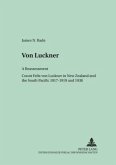With the arrival of 1,400 New Zealand troops in Apia at the beginning of World War I, the government of Samoa was transformed peacefully from a German "protectorate" to a New Zealand military administration. The New Zealand administrator, Colonel Robert Logan, who now found himself in charge of not just hundreds of bored New Zealand troops, but an entire country and its colonial apparatus was, however, completely out of his depth. This is borne out by ensuing events, all documented in detail by Karl Hanssen, manager of the large DHPG German copra production company. Hanssen's complete diaries from August 1914 to May 1915, compiled from the original manuscripts held at the Berlin Federal Archives and the Auckland War Memorial Museum, are presented here for the first time, both in English translation and in the German original. This annotated edition provides a rare and unique insight into the experience of World War I in the South Pacific.
Bitte wählen Sie Ihr Anliegen aus.
Rechnungen
Retourenschein anfordern
Bestellstatus
Storno








